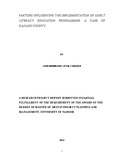| dc.description.abstract | It is important for the adult literacy projects to be implemented adequately for
them to realize the objectives which lead to them being initiated. The main Endeavour
of this study was to establish the challenges that influence the implementation of adult
literacy programs and how they can be overcome. It concentrated on Adult literacy
centers in Kajiado County. The objectives of the study were: to determine how
multiple responsibilities, teaching methodology, availability of learning resources and
the ratio of teachers to learner influence the implementation of adult literacy
education programmes in Kajiado County. The study used the descriptive survey
design. This is because the problem is specific with variables that already exist for the
population in mind to describe. It emphasized on how the independent variables relate
to the dependent variables. Its interest was on the population of learners, teachers and
officers in charge of the thirty-eight literacy centers that implement the adult literacy
education program in Kajiado County. Simple random sampling technique was used
using random numbers generated by the computer to select 241 learners. All the
teachers and officers were selected to make the number 287 people. Data was
collected mainly by questionnaires with both open and closed ended questions. Its aim
was to solicit ideas from the respondents with regards to the variables. Personal
interviews were considered especially for those who could not fill the questionnaires
(illiterate), observation and focused group discussions were also used in centers where
learners were in session. Drop and pick method was used for questionnaires as agreed
with the respondents. Secondary data was also used to analyze and classify variables
related to the problem’s data analysis while the data was analyzed by both descriptive
and analytical methods. From the findings, teacher learner ratio, learning resources
and multiple responsibilities of the adult students have the highest influence on the
implementation of the adult literacy education programmes. Learning resources
would speed up the learning process. Teaching methodology was the least that
influences the adult literacy programme, this study suggests, more teachers should be
employed on full time basis. This will enable the learners to attend classes at any time
of the day when it’s convenient for them. More materials should be provided in the
centers. The programme should also focus on getting permanent premises. The
centers also need to be increased so that they can be easily accessible by the people
who want to join the programme. | en_US |

